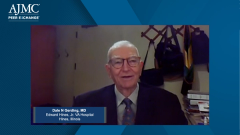
An Overview of Fecal Microbiota Transplant Use in C. Diff Infection
Experts focus on the current state of fecal microbiota transplant as a treatment option for clostridium difficile infection.
Episodes in this series

Transcript:
Neil Minkoff, MD: Who’s the most appropriate patient for FMT [fecal microbiota transplantation]? There’s guidance from the FDA from a couple of years ago. Whom do you recommend for FMT?
Jessica Allegretti, MD, MPH: It’s always important to remind everyone that FMT is not FDA approved for any indication, including recurrent Clostridioides difficile [C diff]. The FDA continues to hold a policy called enforcement discretion, in which you’re allowed to provide this therapy clinically for anybody with C diff not responding to standard of therapy as long as you continue to state that it’s investigational and perform a very good and informed consent process. You don’t require an investigational new drug license to do this.
The guidance in both ID [infectious disease] and GI [gastrointestinal] guidelines is for multiply recurrent C diff. That’s defined as 3 or more confirmed episodes, and we stress the word confirmed. You want the test results. You want to know that this is real, because often patients will get put in a C diff box and continue to get courses of vancomycin without any repeat testing. I want to see those test results. I want to know that the patient also had response to vancomycin or fidaxomicin. Because if they didn’t, that’s another clinical clue that something else may be going on that needs to be investigated. Colleen Kelly’s group has shown that the younger the patient is, the more likely they are to have an alternative diagnosis, not recurrent C diff. It’s important to make sure you’ve done all your due diligence. But if the patient truly has recurrent C diff, they should be offered an FMT and given that opportunity.
We’ve looked at many high-risk patient populations: inflammatory bowel disease, immunosuppressed patients, cirrhotics, and solid organ transplant. It’s safe in all these patient populations and can be utilized. The discussion around how to deliver it, donor screening, and donor material remains interesting. Traditionally, still in 2021 in the adult world, the most common way to offer this is via a colonoscopy. There are capsule preparations, but that’s more difficult to obtain on the routine clinical side. There will eventually be FDA-approved products that are FMT-like that we can use.
But standardly, it’s mostly via colonoscopy or flexible sigmoidoscopy. I do this routinely. It’s interesting from the payer side because this isn’t FDA approved, so there’s no CPT [current procedural terminology] code for donor stool. You also have to figure out who’s going to pay for this. We bill for the colonoscopy. There’s a code for that, in that you’re doing an FMT via a colonoscopy, but the donor stool question remains interesting. You have to decide within your health system who’s paying for this.
At my health system, we pay for the material ourselves and provide it to the patient at no cost to them. At other institutions, patients will pay out of pocket for material. That’s an ongoing discussion. As long as the policy of enforcement discretion remains—who knows how long it will be—it remains a complex issue.
Transcript edited for clarity.
Newsletter
Stay ahead of policy, cost, and value—subscribe to AJMC for expert insights at the intersection of clinical care and health economics.














